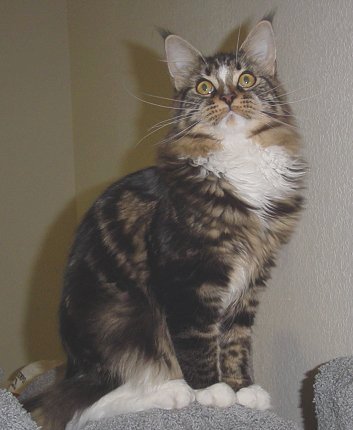Maine coon are the largest breed of domesticated cats.
The Maine Coon is very well known for its intelligence and beautiful physical appearance. The Maine Coon cat is also known as the gentle giant due to its distinctive physical characteristics and playfulness.
 Maine Coon cat is one of the oldest breeds and is believed to be originated from England. It is believed by most breeders that Maine Coon cat was originated in matings between pre existing short haired cats in England and overseas long-hairs resulting in this beautiful breed of cats known as The Maine Coon Cat.
Maine Coon cat is one of the oldest breeds and is believed to be originated from England. It is believed by most breeders that Maine Coon cat was originated in matings between pre existing short haired cats in England and overseas long-hairs resulting in this beautiful breed of cats known as The Maine Coon Cat.
Maine Coon are very large and very energetic cats hence the reason of the name “gentle giant” given to this breed of cat. Maine Coon cats can sometime reach 11-12 Kilograms. Maine Coon cats often have brown color with tabby markings but Maine Coons can be found in almost all colors. Maine Coons generally have medium long but dense fur on the chest which is one of the similarity between Maine Coon cats and lion. Fur of Maine Coon consists of two layers which gives the breed their key physical feature that pet owners are proud of. Fur of Maine Coon is generally very soft and they have long hairs on the back of their legs which helped them keep warm in the harsh winters of England.
The Maine Coon cats are often distinguished by their intelligence and playfulness. One of their best quality is their tendency to use their paws extensively and for that reason a Maine Coon cat will very easily learn how to open doors or pick up small objects or play with small toys some even use their paws while eating. For that reason Maine Coon is favored over other breeds as a domestic pet cat since it is easy to train and due to their above average intelligence.
Generally speaking, Maine coon cats have very low aggressive tendencies compared with other breeds[1].
Disease susceptibility
Potential health issues in Maine Coon cats include:
- Maine coon cardiomyopathy[2]
- Hip dysplasia
- Gingivitis-periodontitis (juvenile-onset)
- Hypokalemic polymyopathy
- Haemophilia[3]
- Myositis ossificans[4]
References
- ↑ Takeuchi Y & Mori Y (2009) Behavioral profiles of feline breeds in Japan. J Vet Med Sci 71(8):1053-1057
- ↑ Wess G et al (2010) Association of A31P and A74T polymorphisms in the myosin binding protein C3 gene and hypertrophic cardiomyopathy in Maine Coon and other breed cats. J Vet Intern Med 24(3):527-532
- ↑ Brown R (2008) Haemophilia in Maine Coon cats. Vet Rec 163(22):667
- ↑ Yabuzoe A et al (2009) Fibrodysplasia ossificans progressiva in a Maine Coon cat with prominent ossification in dorsal muscle. J Vet Med Sci 71(12):1649-1652